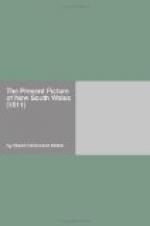Yet there are many of the natives who feel no disinclination to mix with the inhabitants occasionally—to take their share in the labours and the reward of those who toil. Amongst these there are five in particular, to whom our countrymen have given the names of Bull Dog, Bidgy Bidgy, Bundell, Bloody Jack, and another whose name I cannot call to recollection, but who had a farm of four acres and upwards, planted with maize, at Hawkesbury, which he held by permission of Governor King; and the other four made themselves extremely useful on board colonial vessels employed in the fishing and sealing trade, for which they are in the regular receipt of wages. They strive, by every means in their power, to make themselves appear like the sailors with whom they associate, by copying their customs, and imitating their manners; such as swearing, using a great quantity of tobacco, drinking grog, and other similar habits. These natives are the only ones, I believe, who are inclined to industrious behaviour, and they have most certainly rendered more essential services to the colony than any others of their countrymen, who, in general, content themselves with assisting to draw nets for fish, for the purpose of coming in for a share of the produce of others toil.
The general pursuits of the natives, their manners and customs, have been so accurately described by preceding writers on the subject, that I shall forbear from entering into more minute particulars, which would swell my sketch far beyond its intended limits, and could add nothing to the knowledge of which the well-informed reader is already possessed. It will be sufficient to remark, that such as the inhabitants of the interior of New Holland were represented ten years since, they still remain, as the antecedent remarks must sufficiently illustrate: The jealousy of the new settlers, which originally existed, has indeed entirely vanished; but the proximity of a civilized colony has not tended in the least to polish the native rudeness and barbarism, which mark the behaviour of the original inhabitants of this remote spot of the universe.




